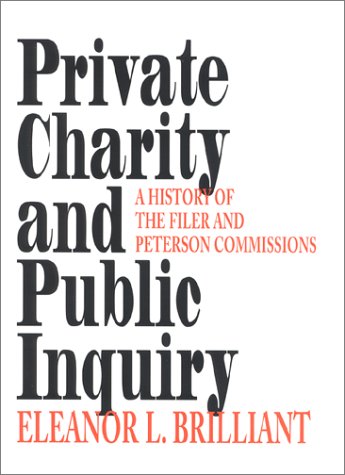

Most ebook files are in PDF format, so you can easily read them using various software such as Foxit Reader or directly on the Google Chrome browser.
Some ebook files are released by publishers in other formats such as .awz, .mobi, .epub, .fb2, etc. You may need to install specific software to read these formats on mobile/PC, such as Calibre.
Please read the tutorial at this link: https://ebookbell.com/faq
We offer FREE conversion to the popular formats you request; however, this may take some time. Therefore, right after payment, please email us, and we will try to provide the service as quickly as possible.
For some exceptional file formats or broken links (if any), please refrain from opening any disputes. Instead, email us first, and we will try to assist within a maximum of 6 hours.
EbookBell Team

0.0
0 reviewsPrivate Charity and Public Inquiry
A History of the Filer and Peterson Commissions
Eleanor L. Brilliant
The story of two commissions that had a major impact on philanthropic activity and public policy.
In the midst of the tumultuous 1960s, the United States Congress turned its attention to issues of tax policy and philanthropy, with special focus on abuses and responsibilities of philanthropic foundations. During the period marked by passage of the Tax Reform Act of 1969, John D. Rockefeller 3rd was one of the staunchest defenders of philanthropy in public and in behind-the-scenes lobbying in Washington. This book is a history of two major commissions initiated by Rockefeller: The Commission on Foundations and Private Philanthropy (1969-1970), dubbed "The Peterson Commission" after its chairman, Peter G. Peterson; and The Commission on Private Philanthropy and Public Needs (1973-1977), headed by John H. Filer, and known as "The Filer Commission."
Brilliant analyzes the significance of the two commissions with regard to philanthropy and public policy, and in light of the value that Americans place on voluntary associations. Using original documents of the two commissions, archival material, and extensive interviews with key informants, Brilliant shows how powerful individuals and groups influence tax policy in the United States. Her analysis provides new insights into the two sides of philanthropy doing good and getting rewarded for it through tax benefits.
Eleanor L. Brilliant, Professor of Social Work at Rutgers University, teaches courses on social policy, management, organization theory, and women’s issues. She is on the Graduate Faculty of Rutgers University and is a member of the Women’s Studies Faculty. She is currently Vice President for Administration/Secretary of ARNOVA. Among her major publications are The United Way: Dilemmas of Organized Charity and The Urban Development Corporation: Private Interests and Public Authority. She is completing a national study of women’s funds and the Women’s Funding Network.
Philanthropic Studies—Dwight F. Burlingame and David C. Hammack, editors
Contents
Preface
Note on Archival Sources
Introduction
Point and Counterpoint: Charities, New Committees, and Tax Policy
Leading to Reform: Patman, Treasury, and Congress
The Gathering Storm
In Whose Interest?
Law and Regulation
The Peterson Commission: A Summation
After the TRA: Emergence of a New Commission
The Filer Commission in Action
Filer Commission Follow Up: Missed Opportunities and Emergent New Groups
Lessons from the Past and Issues for the Future